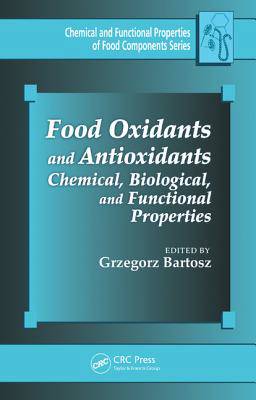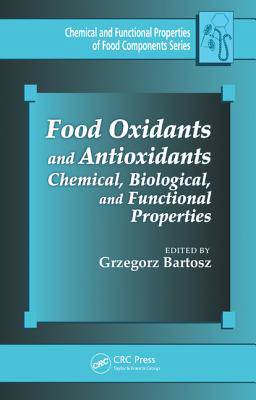
- Retrait gratuit dans votre magasin Club
- 7.000.000 titres dans notre catalogue
- Payer en toute sécurité
- Toujours un magasin près de chez vous
- Retrait gratuit dans votre magasin Club
- 7.000.0000 titres dans notre catalogue
- Payer en toute sécurité
- Toujours un magasin près de chez vous
Food Oxidants and Antioxidants
Chemical, Biological, and Functional Properties
442,95 €
+ 885 points
Description
Food antioxidants are of primary importance for the preservation of food quality during processing and storage. However, the status of food depends on a balance of antioxidants and prooxidants occurring in food. Food Oxidants and Antioxidants: Chemical, Biological, and Functional Properties provides a single-volume reference on the effects of naturally occurring and process-generated prooxidants and antioxidants on various aspects of food quality.
The book begins with a general introduction to oxidation in food and then characterizes the main oxidants present in food, including enzymatic oxidants. Chapters cover oxidation potential, mechanisms of oxidation of the main food components (proteins and lipids), addition of exogenous oxidants during food processing, and the effects of physical agents such as irradiation, freeze-thawing, and high hydrostatic pressure during processing. The book also discusses the effects of oxidation on sensory characteristics of food components and analyzes how oxidation and antioxidants affect the nutritive and health-promoting features of food components. The text examines natural antioxidants in food, including lesser-known ones such as amino acids and polysaccharides, antioxidants generated in food as a result of processing, mechanisms of antioxidant activity, and measurement of antioxidant activity of food components. It explores the bioavailability of curcuminoid and carotenoids antioxidants and presents case studies on natural food antioxidants, presenting novel extraction methods for preservation of antioxidant activity. The final chapters address functional antioxidant foods and beverages as well as general ideas on the effects of food on the redox homeostasis of the organism.Spécifications
Parties prenantes
- Editeur:
Contenu
- Nombre de pages :
- 568
- Langue:
- Anglais
- Collection :
Caractéristiques
- EAN:
- 9781439882412
- Date de parution :
- 21-06-13
- Format:
- Livre relié
- Format numérique:
- Genaaid
- Dimensions :
- 163 mm x 234 mm
- Poids :
- 929 g

Les avis
Nous publions uniquement les avis qui respectent les conditions requises. Consultez nos conditions pour les avis.





